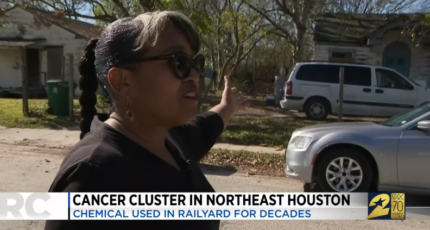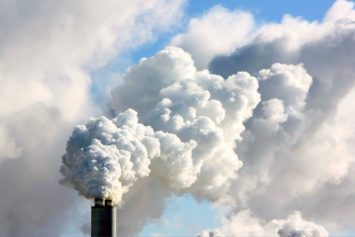
There was a time when Newark, N.J., was regarded as an emblem of American industrialism. The city is home to the third-largest port in the nation and is a major hub for shipping, air and rail, providing an abundance of white-collar jobs and making it a popular commute for nearby New Yorkers. Though good for the economy, these developments have wrought an environmental plague upon the residents of Newark, a majority Black city. As the Trump administration favors oil, gas and coal industries over the disenfranchised communities most impacted by their greed, it will be up to cities like Newark to step up and demand accountability on a local level.
According to an estimate by the New Jersey Department of Environmental Protection, diesel particulate levels surrounding the Port Newark–Elizabeth Marine Terminal are up to 1,000 times greater than levels considered safe to breathe. Newark holds the nation’s second-greatest cancer risk due to diesel emissions and 1 child in every 4 suffers from asthma. This pollution has led to children living in the city being hospitalized at a rate 150-percent greater than the rest of New Jersey and asthma attacks are now a leading cause of school absenteeism in the region. Newark is just one example of how the health of our environment directly impacts the health of the people who live there, children and the elderly in particular.
Despite these conditions, government at all levels has been slow to act. A program funded by the Port Authority that would have replaced old trucks to potentially reduce emissions by 95 percent was abandoned early last year, despite similar programs being successfully executed in Los Angeles and Long Beach, the country’s fifth- and 10th-largest ports, respectively. Meanwhile, New Jersey Gov. Chris Christie has spent half-a-billion dollars redeveloping the Atlantic City airport and $1.8 billion repairing the crumbling Pulaski Skyway, which connects Jersey City with Newark. Christie has been considered one of the least friendly governors to the concerns of environmental health disparities effecting the Black community. Many consider the end of Christie’s term this year as an opportunity to elect a more environmentally aware politician.
Instead, the fight against environmental racism has been left to people like Newark Congressman Donald J. Payne, who is doing his part to raise awareness of environmental injustices both within his city and nationwide. In an article published on Earth Day, he criticized the Trump administration’s anti-climate policies as a direct threat to the health of African-American communities and called for environmental justice to become a civil rights issue. He pointed to Newark’s history-making ordinance, which requires city developers requesting environmental permits to provide the city with the project’s potential environmental impacts, as an example of how affected cities can fight back. The ordinance was first proposed to Newark officials in 2012 by the New Jersey Environmental Justice Alliance and allied organizations, and in 2014, when Ras Baraka was elected mayor of Newark, he committed to passing the ordinance in his transition plan.
Often praised for his environmental legacy, former President Barack Obama understood that poor communities of color suffer the most when we deny the realities of environmental racism and climate change. During his two terms as president, Obama passed a record number of environmental regulations and protected over 550 million acres of land — more than double the amount of famous conservationist Theodore Roosevelt. Unfortunately, climate change denial and the focus on increasing fossil fuels appears to now be a platform under the Trump administration, which wasted no time in rolling back Obama’s history-making environmental protections. Since being in office, Trump has proposed to cut funding to the Environmental Protection Agency by up to 31 percent and mandated that all EPA studies and data be reviewed by political staffers before being released to the public. He’s gutted Obama’s Clean Power Plan, ordered a review of federal protected lands and just last week signed an executive order allowing offshore drilling for oil and gas. It was these actions that pushed Mustafa Ali, head of the EPA’s Office on Environmental Justice, to resign from his post after a 24-year career, telling reporters that he could not be a part of the department’s new direction. In his resignation letter, Ali pleaded with EPA administrator Scott Pruitt to reconsider defunding programs aimed at assisting disadvantaged areas.
No longer able to rely on federal support, local and state governments must step up and pass legislation that prioritizes environmental justice. Improving infrastructure to provide residents with more walkable cities, creating more green spaces and establishing sensible emissions regulations are just a few steps that can be taken to minimize pollution and maximize local quality of life.
Like most issues, environmental justice is best achieved through cooperation. Without practical guidance from the federal government, it will be up to states, cities and communities to work together to bridge the divide. Climate issues and environmental racism are pressing concerns for Black communities and President Trump, who just cleared 100 days in office, has already taken actions that will devastate our environment for years to come. As Payne suggests in his column, it will now fall upon concerned citizens to go the extra mile to stay informed about local policies and demand equal involvement in environmental decision-making. We must push for environmental literacy and look critically at the way we casually contribute to the deterioration of our communities by refusing to recycle or littering our streets. Civil rights activists must recognize the role of environmental justice in helping us achieve equality so that, together, we can progress toward a healthier future.


